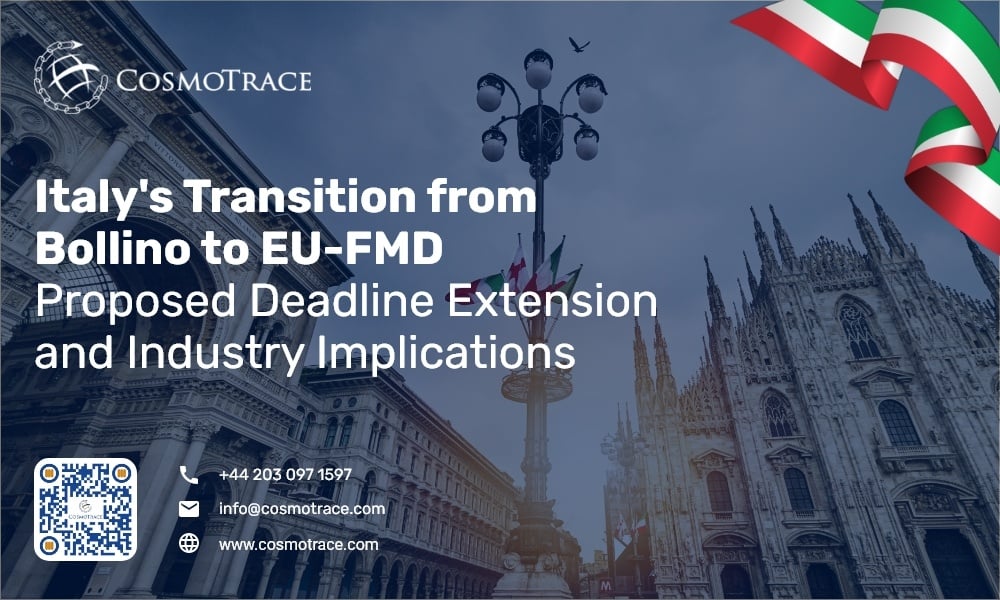Reference: 19th Legislature - 10th Permanent Commission - Summary report no. 247 of 26/11/2024 (Accessed on February 6, 2025. https://www.senato.it/japp/bgt/showdoc/print/19/SommComm/0/1435785/doc_dc-allegato_a)
Background on the Bollino System and EU-FMD
Italy’s current medicine tracking system relies on the pharmaceutical label, as established by Legislative Decree No. 540 of December 30, 1992, and Legislative Decree No. 219 of April 24, 2006.
Italy's "Bollino" system has long been a cornerstone of the nation's pharmaceutical traceability, utilizing tamper-evident labels to ensure the authenticity of medicinal products. However, to harmonize with broader European standards aimed at combating counterfeit medicines, Italy is transitioning to the EU-FMD framework. This shift necessitates significant changes in packaging, serialization, and data management for pharmaceutical companies.
In a recent development, Italy's 10th Permanent Commission of the 19th Legislature has proposed an extension to the timeline for transitioning from the traditional "Bollino" system to the European Union's Falsified Medicines Directive (EU-FMD) compliance. This proposal, detailed in Summary Report No. 247 dated November 26, 2024, suggests extending the deadline beyond the previously established date of February 9, 2025.
Challenges Leading to the Proposed Extension
The Commission's proposal for an extended timeline stems from several challenges identified during the transition process:
- Technical Integration: Aligning existing national systems with the EU's centralized databases has proven more complex than anticipated.
- Resource Allocation: Pharmaceutical companies, especially small and medium-sized enterprises, have faced difficulties in allocating the necessary resources for system upgrades and staff training.
- Supply Chain Coordination: Ensuring that all stakeholders, from manufacturers to distributors, are synchronized in their compliance efforts has been a logistical challenge.
Taking into account the opinion expressed by the Permanent Conference for Relations between the State, Regions, and Autonomous Provinces of Trento and Bolzano, the Commission expresses a favourable opinion on the decree. While the decree’s provisions will officially take effect on February 9, 2025, a 24-month stabilization phase in test mode must be implemented to address critical challenges related to the introduction of new technological solutions affecting national tracking and reimbursement processes. During this period:
- The Ministry of Health must issue specific operating guidelines to define implementation procedures.
- Medicine traceability and reimbursement must still be ensured through the anti-tampering device, requiring pharmacists to register relevant data.
- For the first eight months, penalties imposed on manufacturers for failing to affix the unique identifier must be reduced by 90% to account for the time required to obtain necessary authorizations and for the supply chain to fully comply.
- Sanctions related to the verification, deactivation, and reactivation of the unique identifier must not be enforced for the first 12 months. In the subsequent 12 months, these penalties will be reduced by 90% to facilitate industry adaptation.
This phased approach ensures a smoother transition to the new system, allowing time for necessary adjustments while maintaining medicine traceability and security.
Implications of the Proposed Extension
If approved, the extended timeline would provide:
- Additional Preparation Time: Allowing companies to thoroughly test and validate new systems to ensure seamless integration.
- Training Opportunities: Enabling comprehensive training programs for personnel to effectively manage new compliance requirements.
- Supply Chain Alignment: Facilitating better coordination among all parties involved in the pharmaceutical supply chain to ensure uniform compliance.
Next Steps
The proposal is currently under review, and stakeholders are encouraged to stay informed about further developments. Companies should continue their preparation efforts while awaiting official confirmation of any deadline extensions. This proposed extension reflects the Commission's recognition of the challenges faced by the industry and its commitment to ensuring a smooth and effective transition to EU-FMD compliance.


